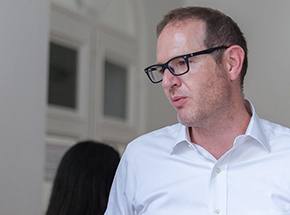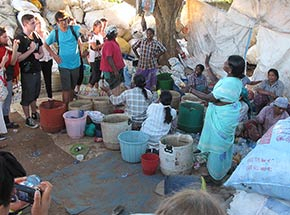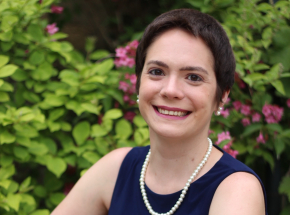- About AUP
- History of AUP
- Mission & Core Values
- Vision and Leadership
- AUP Recognition
- Alumni Success
- Campus Development
- Arts at AUP
- Policies & Guidelines
- Academics
- Undergraduate
- Graduate Programs
- MA in Diplomacy and International Law
- MA in Global Communications
- MSc in Human Rights and Data Science
- MA in International Affairs
- MA in International Affairs, Conflict Resolution, and Civil Society Development
- MSc in International Management
- MSc in Strategic Brand Management
- Find Your Thesis Advisor
- Previous Programs
- Cultural Program
- Faculty
- Summer School
- Research Centers
- The Center for Critical Democracy Studies
- The Center for Writers and Translators
- The George and Irina Schaeffer Center for the Study of Genocide, Human Rights and Conflict Prevention
- The Joy and Edward Frieman Environmental Science Center
- The Center for Media, Communication & Global Change
- Departments
- Academic Resources
- Academic Affairs
- Academic Calendar
- Academic Resource Center
- Library
- Registrar's Office
- Teaching and Learning Center
- Employer Network
- Accessibility & Accommodation Services
- Quai D'Orsay Learning Commons
- Paris as Classroom
- ACE Center
- Admissions
- Student Life
- Campus
- Get Involved
- Paris
- Support Services
- Student Development Help Desk
- Student Accounting Services
- Student Immigration Services
- Student Grievance Procedure
- Accessibility at AUP
- Diversity and Inclusion
- Health & Well-being
- Digital Student Handbook
- News
- Events
- AUP Giving
- Housing Offer for 2024-2025
- Housing | Spring 2024
- IRIS Project
- IT Services
- Alumni
- About AUP
- History of AUP
- Mission & Core Values
- Vision and Leadership
- AUP Recognition
- Alumni Success
- Campus Development
- Arts at AUP
- Policies & Guidelines
- Academics
- Undergraduate
- Graduate Programs
- MA in Diplomacy and International Law
- MA in Global Communications
- MSc in Human Rights and Data Science
- MA in International Affairs
- MA in International Affairs, Conflict Resolution, and Civil Society Development
- MSc in International Management
- MSc in Strategic Brand Management
- Find Your Thesis Advisor
- Previous Programs
- Cultural Program
- Faculty
- Summer School
- Research Centers
- The Center for Critical Democracy Studies
- The Center for Writers and Translators
- The George and Irina Schaeffer Center for the Study of Genocide, Human Rights and Conflict Prevention
- The Joy and Edward Frieman Environmental Science Center
- The Center for Media, Communication & Global Change
- Departments
- Academic Resources
- Academic Affairs
- Academic Calendar
- Academic Resource Center
- Library
- Registrar's Office
- Teaching and Learning Center
- Employer Network
- Accessibility & Accommodation Services
- Quai D'Orsay Learning Commons
- Paris as Classroom
- ACE Center
- Admissions
- Student Life
- Campus
- Get Involved
- Paris
- Support Services
- Health & Well-being
- Digital Student Handbook
- News
- Events
- AUP Giving
- Housing Offer for 2024-2025
- Housing | Spring 2024
- IRIS Project
- IT Services
- Alumni
Faculty
Professor Cath
The Program Director of AUP’s MSc in International Management discusses the program’s unique take on tackling complex problems in the 21st-century.
Related Graduate Programs :
Let’s start by discussing your research background.
I have a PhD and master's degree in management and organizational studies and over 30 years of experience working as an organizational researcher and management consultant in a wide variety of fields, including water management, anthropogenic climate change, health care, and knowledge institutes. My research involves the understanding of complex thinking and coping with complex issues. Social complexity theory states that cause and effect are not simplistic or linear but are rather inseparable and intertwined. Many of the problems we’re facing today as a society are what we term wicked problems, meaning they are influenced by many interdependent factors that make them seem impossible to solve. Anthropogenic climate change is the most prominent example. In the MSIM program, we aim to prepare students to tackle such problems.
Hence the program motto, enseigner à vivre, or “learning to live,” has been chosen.
“Learning to live,” a position coined by the French sociologist and philosopher Edgar Morin, is a good description of our educational pedagogy. We teach established conventional management strategies and more critical approaches such as social complexity theory and business ethics. That’s really the heart and soul of the program: we want students to think about how human beings can live on this planet in an improved way. When addressing complex issues, we shouldn’t reduce them to simple, isolated cause-and-effect chains; we should always allow more context. At AUP, we educate our students to face the challenges of the 21st century, so they can take a stance on business ethics, sustainability, and anthropogenic climate change alongside managing and organizational strategy.
What kind of student does MSIM best suit?
We have students from varied backgrounds who arrive in Paris for all kinds of reasons. Some come to continue their studies after bachelor’s programs, while others have already had a professional career and are looking to pivot into new roles or fields. There are as many reasons to come to the program as students who sign up! We have segmented our audience based on our experiences: the “liberal arts manager,” who comes out of undergraduate programs; the “career-pivoter” and the “tool-seeker,” who want to add management into their mix of previous education and professional experiences; and the “second-chancer” and "meaning-seeker,” motivated students who are not sure what they want to do with their lives. We learn so much from our students and their management experiences before they came to the program. All we ask for is engagement.
What makes the MSIM program unique?
We separate ourselves from conventional business schools by being a small program at a small university, which allows for a high level of interaction between students and greater student–faculty collaboration. We also embed ourselves in a liberal arts tradition, by which I mean we are interdisciplinary. Students bring their narratives and takes on the world into the classroom discussion. We explore different pedagogical approaches, emphasizing experiential learning, study trips, project-based approaches, and working with live clients in order to overcome the gaps between theory and practical experience. We also take the learning objectives of students very seriously and tailor the program appropriately.
And how is the program international?
Well, firstly, due to our course offerings. We present, for example, case studies with an international context; we don’t only focus on Europe or America. Secondly, because the students come from all corners of the planet. It also helps that we are in Paris, one of the world’s archetypal international cities.
What differentiates the program’s three tracks?
In all three tracks, we have core courses that provide an overview of general management. The Sustainability Systems Track and NGO and Mission-Based Management Track differ in focusing on specific issues through case studies, directed studies, and a project-based pedagogy. Specific electives are integrated into the core requirements, and the examples used in classes focus on the chosen field. You earn a specific diploma tailored to those particular management issues. There are lots of opportunities to adapt what you are studying to your personal interests.
What appeals to you personally about working at AUP?
While teaching at AUP has, for me, been life-transforming, I’d also like to mention the incredible support I receive from my colleagues. I’m part of a wonderful department, and that’s been very helpful when taking on the role of program director. There’s a real collective effort from my colleagues – a mutual engagement with the world around us that translates into all kinds of intellectual concepts. The previous program director, Professor Robert Earhart, left me with an impressive legacy. We are building on great foundations and, though there will always be challenges, the program is moving forward in a very constructive way.
One of the new additions to the program is a directed study involving a collaborative publication. How did this book project come about?
In May 2020, a student approached us and asked if we could run a project over the summer. Soon, other students joined in with a directed study, helping to create a book for publication. The book proposes that Covid-19 is a dress rehearsal for the kinds of social and environmental problems to come, which we’ve begun to see in manifestations of extreme weather, for example. We look at how we can strategize sustainability in a post-Covid world. Our students do such excellent work through the program, but it often stays anonymous; a publication was a great way to ensure students’ work could be brought to the world. All of those students can now say they are published authors because one student took the initiative to reach out. We’re already working on a second book project – I like that kind of emergence.
Related
-

Professor Earhart
Faculty
Read MoreProfessor Earhart
Faculty
I still occasionally take consulting gigs, and I usually target projects that are related to my research areas or offer opportunities for student involvement.
-

MSIM in India
Featured Course
Read MoreMSIM in India
Featured Course
The Sustainable Development Practicum in Auroville, India, pairs an academic understanding of sustainable development with hands-on experience working with...
-

Heather
Student
Read MoreHeather
Student
I am so grateful to be part of the AUP community – it has really become my family.

